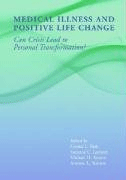Medical Illness and Positive Life Change: Can Crisis Lead to Personal Transformation?

Edited by Crystal L. Park, Suzanne C. Lechner, Michael H. Antoni, and Annette L. Stanton
American Psychological Association
Washington, D.C., 2009
Stress-related growth examined in challenging work
Reviewed by James K. Luiselli, Ed.D., ABPP, BCBA-D
Medical illnesses and chronic health problems are the focus of this book but not from a negative or fatalistic perspective. Rather, the book examines positive life changes as sequelae to serious illness. Akin to positive psychology, the concepts and applications detailed in the book have been described interchangeably as stress-related growth, posttraumatic growth and benefit finding.
The editors assembled 12 chapters that are based on the first Positive Life Changes in the Context of Medical Illness conference convened in 2005. The chapters are authored by recognized experts and are spread among five topical sections. The integrative theme connecting the chapters is “the phenomenon of positive life change in the context of physical illness and health psychology.”
Part I of the book concerns conceptual and methodological issues. The chapters reveal that clinicians and researchers continue to debate the core elements of beneficial posttraumatic experiences as they relate to health complications. Additionally, assessment methodology remains at a nascent stage.
In Part II, Developmental Issues, the chapter authors consider positive growth in children and adolescents with diabetes and adults facing debilitating medical conditions. To be expected, stress-promoted growth must be embraced from developmental and life-span perspectives, something the book does well.
Part III, Factors That Influence Positive Life Change, covers patients with HIV/AIDS, breast cancer, acoustic neuroma and heart disease. The chapters alert us to the many perceptions and coping strategies that people adopt in response to poor and improved health status. There is also an informative chapter about the life-enhancing contribution of interpersonal relationships in the aftermath of catastrophic illness.
The chapters in Part IV, Effects of Positive Life Change, reflect on “psychological and physiological mechanisms through which perceived positive life changes may influence health.” Different theoretical models, it seems, predict different outcomes, be they biological correlates or cognitive appraisal.
Finally, Part V looks at Clinical Applications, most notably psychosocial, cognitive and behavioral approaches. The authors emphasize multi-component interventions that include but are not limited to anxiety reduction, social support, emotional processing and quality of life. One of the chapters endorses the intriguing idea of clinicians adopting the role of expert companion with patients.
The primary audience for this book is clinical health psychologists as well as other professionals in the medical arena. Because the book deals with a rapidly evolving subject, there is variability in content from chapter to chapter. However, the editors succeed in appraising health psychology from an often overlooked vantage point.
Many of the chapters are dense with conceptual reasoning, theoretical discourse and research analysis. So, you should be prepared for anything but a “casual read.” Note, too, that you will be challenged by some of the medical rhetoric contained in its pages. My approach was to carefully consider each chapter in order to better understand the current status and anticipated direction of stress-related growth and benefit finding.
In summary, “Medical Illness and Positive Life Change” contributes meaningfully to the intersecting fields of medicine and psychology. It poses more questions than it provides answers and is both speculative and pragmatic. This is a good book that brings wisdom and advice to mental health professionals concerned about the care and long-term welfare of people experiencing medical life crises.
James K. Luiselli, Ed.D., ABPP, BCBA-D, is senior vice president, applied research, clinical training and peer review at the May Institute in Norwood, Mass.
Learn more about the book: Medical Illness and Positive Life Change: Can Crisis Lead to Personal Transformation? (Decade of Behavior)
